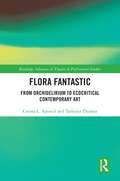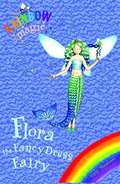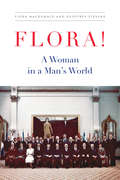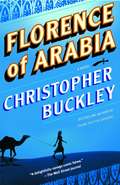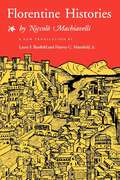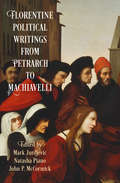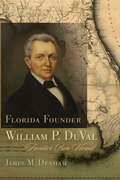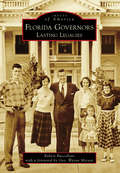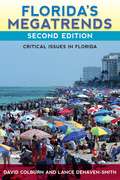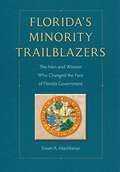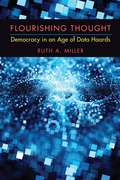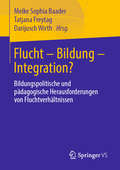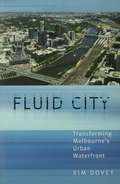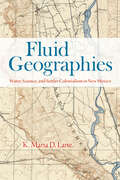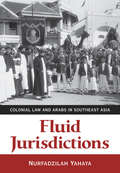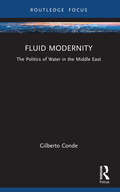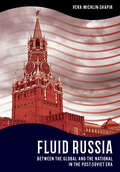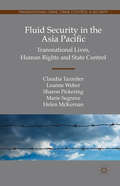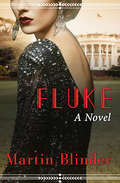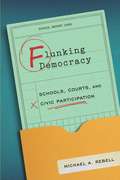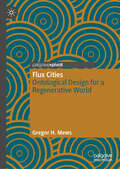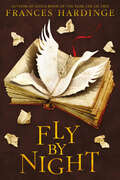- Table View
- List View
Flora Fantastic: From Orchidelirium to Ecocritical Contemporary Art (ISSN)
by Corina L. Apostol Tashima ThomasThis book delves deep into colonial botany, utilizing mediums such as historical investigation, cinema, photography, live performance, and installation art.Surveying perspectives from Europe, the U.S., Africa, Southeast Asia, Latin America, and the Caribbean, it positions plants—both native and foreign—as active participants and silent observers in colonial narratives. By viewing through the prism of visual and performance art, this book touches on diverse topics like the economic value of plants, traditional and Western medicine, state‑endorsed scientific endeavors, migration patterns of flora and people, bio‑contact areas, nationalistic views, and botanical diplomacy. It offers fresh insights into colonial botany’s multifaceted history, emphasizing the intricate interplay between Eastern, Western, and Southern nations during the twentieth century and its enduring impact today.Serving as an invaluable addition to the realms of art history, performance studies, botany, visual culture, decolonial initiatives, and environmental politics, this book arrives at a pivotal moment when its insights are most crucial.
Flora Tristan: Feminism In The Age Of George Sand
by Sandra DijkstraA new edition of an influential biography of the early Victorian socialist feminist writer Flora Tristan.Active in the 1830s and 1840s, Flora Tristan is best known for her book "Workers' Union," an account of the conditions of women and workers in Peru, London, Paris and the provinces of France. Regarded as something of a pariah, she was one of the first women radicals to draw clear connections between the plight of disaffected workers and powerless women. Her version of socialism has been regarded as leading towards Marx. Sandra Dijkstra aims to paint a clear picture of Tristan as a class- and gender-conscious women writer in a transitional historical period, and to demonstrate her influence on Marxism.
Flora the Fancy Dress Fairy
by Daisy MeadowsRachel's cousin is holding a summer fancy dress ball in a Scottish Castle and Rachel and Kirsty have been invited along.
Flora!: A Woman in a Man's World
by Geoffrey Stevens Flora MacDonaldFlora Isabel MacDonald – politician, humanitarian, adventurer, and role model for a generation of women – was known across Canada and beyond simply as Flora. In her memoir, co-authored by award-winning journalist and author Geoffrey Stevens, she tells her personal story for the very first time.Flora! describes her amazing journey from her childhood and her time at secretarial school in Cape Breton, through her years in backroom Progressive Conservative politics, to elected office and her appointment as Canada’s first female minister of foreign affairs. Finally, she details her exceptional humanitarian work in India and in war-torn Africa and Afghanistan. Flora was driven by a lifelong conviction that there is nothing a woman cannot achieve in a world controlled by men, and she pursued this conviction in everything she did, carving a path for women in Parliament. She won international acclaim for bringing 60,000 Vietnamese refugees to Canada, and for engineering the rescue of six American hostages in Tehran in a top-secret collaboration with the CIA known as the Canadian Caper. She exposed the inhumane treatment of inmates at Kingston’s Prison for Women. She defied male chauvinists in the Progressive Conservative party by running for its leadership, and she introduced the Employment Equity Act to guarantee women equal access to federal jobs.Flora was brave. She was relentless. She was controversial. She was a force of nature. In her own words and drawing from interviews with those who knew her, Flora! grants us insight into this exceptional woman who changed the course of history.
Florence of Arabia: A Novel
by Christopher BuckleyThe bestselling author who made mincemeat of political correctness in Thank You for Smoking, conspiracy theories in Little Green Men, and Presidential indiscretions No Way to Treat a First Lady now takes on the hottest topic in the entire world-Arab-American relations-in a blistering comic novel sure to offend the few it doesn't delight.Appalled by the punishment of her rebellious friend Nazrah, youngest and most petulant wife of Prince Bawad of Wasabia, Florence Farfarletti decides to draw a line in the sand. As Deputy to the deputy assistant secretary for Near East Affairs, Florence invents a far-reaching, wide-ranging plan for female emancipation in that part of the world.The U.S. government, of course, tells her to forget it. Publicly, that is. Privately, she's enlisted in a top-secret mission to impose equal rights for the sexes on the small emirate of Matar (pronounced "Mutter"), the "Switzerland of the Persian Gulf." Her crack team: a CIA killer, a snappy PR man, and a brilliant but frustrated gay bureaucrat. Her weapon: TV shows.The lineup on TV Matar includes A Thousand and One Mornings, a daytime talk show that features self-defense tips to be used against boyfriends during Ramadan; an addictive soap opera featuring strangely familiar members of the Matar royal family; and a sitcom about an inept but ruthless squad of religious police, pitched as "Friends from Hell."The result: the first deadly car bombs in the country since 1936, a fatwa against the station's entire staff, a struggle for control of the kingdom, and, of course, interference from the French. And that's only the beginning.A merciless dismantling of both American ineptitude and Arabic intolerance, Florence of Arabia is Christopher Buckley's funniest and most serious novel yet, a biting satire of how U.S. good intentions can cause the Shiite to hit the fan.From the Hardcover edition.
Florentine Histories
by Niccolo Machiavelli Harvey C. Mansfield Laura F. BanfieldA new tranlation by Laura F. Banfield and Harvey C. Mansfield of Niccolo Machiavelli's Florentine Histories.
Florentine Political Writings from Petrarch to Machiavelli (Haney Foundation Series)
by Mark Jurdjevic John P. McCormick Natasha PianoIn the fifteenth-century republic of Florence, political power resided in the hands of middle-class merchants, a few wealthy families, and powerful craftsmen's guilds. The intensity of Florentine factionalism and the frequent alterations in its political institutions gave Renaissance thinkers ample opportunities to inquire into the nature of political legitimacy and the relationship between authority and its social context.This volume provides a selection of texts that describes the language, conceptual vocabulary, and issues at stake in Florentine political culture at key moments in its development during the Renaissance. Rather than presenting Renaissance political thought as a static set of arguments, Florentine Political Writings from Petrarch to Machiavelli instead illustrates the degree to which political thought in the Italian City revolved around a common cluster of topics that were continually modified and revised—and the way those common topics could be made to serve radically divergent political purposes.Editors Mark Jurdjevic, Natasha Piano, and John P. McCormick offer readers the opportunity to appreciate how Renaissance political thought, often expressed in the language of classical idealism, could be productively applied to pressing civic questions. The editors expand the scope of Florentine humanist political writing by explicitly connecting it with the sixteenth-century realist turn most influentially exemplified by Niccolò Machiavelli and Francesco Guicciardini. Presenting nineteen primary source documents, including lesser known texts by Machiavelli and Guicciardini, several of which are here translated into English for the first time, this useful compendium shows how the Renaissance political imagination could be deployed to think through methods of electoral technology, the balance of power between different social groups, and other practical matters of political stability.
Florida Founder William P. DuVal: Frontier Bon Vivant
by James M. DenhamThe first full-length biography of the well-connected, but nearly forgotten frontier politician of antebellum America.The scion of a well-to-do Richmond, Virginia, family, William Pope DuVal (1784–1854) migrated to the Kentucky frontier as a youth in 1800. Settling in Bardstown, DuVal read law, served in Congress, and fought in the War of 1812.In 1822, largely because of the influence of his lifelong friend John C. Calhoun, President James Monroe appointed DuVal the first civil governor of the newly acquired Territory of Florida. Enjoying successive appointments from the Adams and Jackson administrations, DuVal founded Tallahassee and presided over the territory’s first twelve territorial legislative sessions, years that witnessed Middle Florida’s development into one of the Old Southwest’s most prosperous slave-based economies. Beginning with his personal confrontation with Miccosukee chief Neamathla in 1824 (an episode commemorated by Washington Irving), DuVal worked closely with Washington officials and oversaw the initial negotiations with the Seminoles.A perennial political appointee, DuVal was closely linked to national and territorial politics in antebellum America. Like other “Calhounites” who supported Andrew Jackson’s rise to the White House, DuVal became a casualty of the Peggy Eaton Affair and the Nullification Crisis. In fact he was replaced as Florida governor by Mrs. Eaton’s husband, John Eaton. After leaving the governor’s chair, DuVal migrated to Kentucky, lent his efforts to the cause of Texas Independence, and eventually returned to practice law and local politics in Florida. Throughout his career DuVal cultivated the arts of oratory and story-telling—skills essential to success in the courtrooms and free-for-all politics of the American South. Part frontiersman and part sophisticate, DuVal was at home in the wilds of Kentucky, Florida, Texas, and Washington City. He delighted in telling tall tales, jests, and anecdotes that epitomized America’s expansive, democratic vistas. Among those captivated by DuVal’s life and yarns were Washington Irving, who used DuVal’s tall tales as inspiration for his “The Early Experiences of Ralph Ringwood,” and James Kirke Paulding, whose “Nimrod Wildfire” shared Du Val’s brashness and bonhomie.“In large brushstrokes, but with great attention to detail, Denham embeds DuVal’s life in a wider portrait of the young Republic, and particularly in issues affecting the western states and the former Spanish borderlands Readers will find in this book a well-researched and well-written history that informs on many levels.” —The Historian“Relying on a variety of sources extending well beyond DuVal’s papers, Denham’s work provides an intriguing account of a southerner immersed in the dynamics of politics at both the local and national levels. The study will be a definitive must for any student of antebellum regional and national history.” —The Journal of Southern History
Florida Governors: Lasting Legacies
by Gov. Wayne Mixson Robert BuccellatoThe state of Florida has a unique place in the annals of national history and has been a constant contributor to the country's identity. The 51 men who have served as the state's governors are an essential part of its complex identity and have produced resonant material for historians of all ages. They have been farmers, generals, boat captains, restaurant owners, presidents, and sons of presidents. They have been given the office by both popular mandate and the happenstance of fate. These individuals have represented virtually every category of what it means to be a Floridian. Their lasting legacies can be felt every day by the state's citizens. Since the drainage of the Everglades and the transformation of swamplands into beachfront paradises, Florida has lured Americans from various states to its sunny shores. It has seceded from the Union, determined the final verdict in many presidential elections, was the site of railroad monopolies, developed into a playground of the rich, and is the birthplace of a new kind of theme park--all while being led by these distinct individuals who, at their core, were Floridians first.
Florida's Megatrends: Critical Issues in Florida
by David Colburn Lance deHaven-SmithIn the first edition of Florida Megatrends, David Colburn and Lance deHaven-Smith revealed the state for what it is: a bellwether for the nation. The intervening years have only confirmed their analyses, as Florida and the U.S. have been battered and transformed by the housing collapse, the great economic recession that began in 2008, record-high gas prices, withering tourism, the 2004 hurricane season, and much more. This completely revised and updated edition brings the story up-to-date.
Florida's Minority Trailblazers: The Men and Women Who Changed the Face of Florida Government (Florida Government and Politics)
by Susan MacManus"Saves a piece of Florida political history by narrating the personal stories of the state's 'minority trailblazers' from the Civil Rights Movement to the present day."--Richard E. Foglesong, author of Immigrant Prince: Mel Martinez and the American Dream "Captures Florida's ongoing political transition from a 'yellow-dog,' lily-white state to one where diversity is beginning to make an impact on politics."--Doug Lyons, former senior editorial writer, South Florida Sun-Sentinel Florida experienced a population surge during the 1960s that diversified the state and transformed it into a microcosm of the nation, but discrimination remained pervasive. With the passage of the Civil Rights Act of 1964 and the Voting Rights Act of 1965, along with later rulings on redistricting and term limits, the opportunity to participate in government became more and more possible for previously silenced voices. Drawing primarily from personal interviews, Susan MacManus recounts the stories of the first minority men and women--both Democrat and Republican--who were elected or appointed to state legislative, executive, and judicial offices and to the U.S. Congress since the 1960s. She reveals what drove these leaders to enter office, how they ran their campaigns, what kinds of discrimination they encountered, what rewards each found during their terms, and what advice they would share with aspiring politicians. In addition to the words of the officeholders themselves, MacManus provides helpful timelines, photos, biographical sketches of each politician, and election results from path-breaking victories. The book also includes comprehensive rosters of minority individuals who have held state offices and those who have gone on to represent Florida in the federal government. Full of inspiring stories and informative statistics, Florida's Minority Trailblazers is an in-depth rendering of personal struggles--guided by opportunity, ambition, and idealism--that have made Florida the vibrant, diverse state it is today. Susan A. MacManus is Distinguished University Professor in the Department of Government and International Affairs at the University of South Florida and the coauthor of Politics in Florida and Politics in States and Communities. A volume in the series Florida Government and Politics, edited by David R. Colburn and Susan A. MacManus
Florizella and the Wolves
by Philippa GregoryPrincess Florizella is no ordinary fairy-tale princess. She doesn't sit around the palace looking pretty and waiting for her prince to come. She's far too busy riding her horse, Jellybean, and looking for adventure with her best friend, Prince Bennett. One day, while out riding in the Purple Forest, Florizella is caught in a storm and takes shelter in a cave, where she meets some surprisingly friendly wolf cubs. When she realizes they're starving, she decides to take them home. But feeding four hungry, growing wolves and hiding them from her parents proves to be more of a challenge than Florizella expected ... Florizella and the Wolves is a fairy tale full of adventure, suspense, and a delightful cast of royal characters that will charm middle-grade readers everywhere.
Flourishing Thought: Democracy in an Age of Data Hoards
by Ruth A. MillerChallenging the posthumanist canon that celebrates the preeminence of matter, Ruth Miller, in Flourishing Thought contends that what nonhuman systems contribute to democracy is thought. Drawing on recent feminist theories of nonhuman life and politics, Miller shows that reproduction and flourishing are not antithetical to contemplation and sensitivity. After demonstrating that processes of life and processes of thought are indistinguishable, Miller finds that four menacing accumulations of matter and information--global surveillance, stored embryos, human clones, and reproductive trash--are politically productive rather than threats to democratic politics. As a consequence, she questions the usefulness of individual rights such as privacy and dignity, contests the value of the rational metaphysics underlying human-centered political participation, and reevaluates the gender relations that derive from this type of participation. Ultimately, in place of these human-centered structures, Miller posits a more meditative mode of democratic engagement. Miller's argument has shattering implications for the debates over the proper use and disposal of embryonic tissue, alarms about data gathering by the state and corporations, and other major ethical, social, and security issues.
Flucht – Bildung – Integration?: Bildungspolitische und pädagogische Herausforderungen von Fluchtverhältnissen
by Meike Sophia Baader Tatjana Freytag Darijusch WirthIn diesem Band werden Fluchtverhältnisse aus Sicht verschiedener wissenschaftlicher Disziplinen beleuchtet. Zudem wird die Erfahrungsperspektive von Praktiker_innen in unterschiedlichen Handlungsfeldern aufgenommen. Theoretische, historische und bildungspolitische Rahmungen, Formen von Verletzlichkeiten im Kontext von Fluchtverhältnissen sowie Möglichkeiten der Teilhabe und Bildung stehen im Zentrum.
Fluid City: Transforming Melbourne's Urban Waterfront
by Kim DoveyFluid City traces the transformation of the urban waterfront of Melbourne, the re-vitalization of the Yarra River waterfront, Melbourne Docklands and Port Philip Bay. As the financial and industrial centre of Australia, in the late nineteenth century, Melbourne developed a new world exuberance. Yet the twentieth century saw Melbourne suffering from a declining industrial and economic base. The city in the 1980s was de-industrialising, and the re-facing of the city to the water was a key urban strategy of the 1980s and 90s and a catalyst for economic transformation. This book bridges significant gaps between different discourses about the city and to challenge singular ways of viewing the city.
Fluid Geographies: Water, Science, and Settler Colonialism in New Mexico
by K. Maria LaneAn unprecedented analysis of the origin story of New Mexico’s modern water management system. Maria Lane’s Fluid Geographies traces New Mexico’s transition from a community-based to an expert-led system of water management during the pre-statehood era. To understand this major shift, Lane carefully examines the primary conflict of the time, which pitted Indigenous and Nuevomexicano communities, with their long-established systems of irrigation management, against Anglo-American settlers, who benefitted from centralized bureaucratic management of water. The newcomers’ system eventually became settled law, but water disputes have continued throughout the district courts of New Mexico’s Rio Grande watershed ever since. Using a fine-grained analysis of legislative texts and nearly two hundred district court cases, Lane analyzes evolving cultural patterns and attitudes toward water use and management in a pivotal time in New Mexico’s history. Illuminating complex themes for a general audience, Fluid Geographies helps readers understand how settler colonialism constructed a racialized understanding of scientific expertise and legitimized the dispossession of nonwhite communities in New Mexico.
Fluid Jurisdictions: Colonial Law and Arabs in Southeast Asia
by Nurfadzilah YahayaThis wide-ranging, geographically ambitious book tells the story of the Arab diaspora within the context of British and Dutch colonialism, unpacking the community's ambiguous embrace of European colonial authority in Southeast Asia. In Fluid Jurisdictions, Nurfadzilah Yahaya looks at colonial legal infrastructure and discusses how it impacted, and was impacted by, Islam and ethnicity. But more important, she follows the actors who used this framework to advance their particular interests. Yahaya explains why Arab minorities in the region helped to fuel the entrenchment of European colonial legalities: their itinerant lives made institutional records necessary. Securely stored in centralized repositories, such records could be presented as evidence in legal disputes. To ensure accountability down the line, Arab merchants valued notarial attestation land deeds, inheritance papers, and marriage certificates by recognized state officials. Colonial subjects continually played one jurisdiction against another, sometimes preferring that colonial legal authorities administer Islamic law—even against fellow Muslims.Fluid Jurisdictions draws on lively material from multiple international archives to demonstrate the interplay between colonial projections of order and their realities, Arab navigation of legally plural systems in Southeast Asia and beyond, and the fraught and deeply human struggles that played out between family, religious, contract, and commercial legal orders.
Fluid Modernity: The Politics of Water in the Middle East (Routledge Focus on Modern Subjects)
by Gilberto CondeFluid Modernity offers an innovative, encompassing, historical grasp of the politics of water in the Middle East in the context of modern capitalism and world politics. Drawing upon conceptions of power by Foucault and Agamben, it examines how water, through its modern capitalist production, is transformed into a water apparatus that binds people to power. In trans-boundary watercourses, states get involved in the formation of international governmentalities. The book revisits the history of fluid modernity in the Middle East from late Ottoman times to the present. It focuses on water conflict and cooperation between states (Israel and Arab states and Turkey, Syria and Iraq), on state policies towards subaltern subjects (Israel and Turkey in relation to Palestinians and Kurds, respectively) and on the water politics of rebellious movements. After a conceptual chapter discussing fluid modernity, the book traces water politics in the region in a diachronic perspective. It explores how water diplomacy, infrastructure loans, reservoir construction, discourses of sovereignty and conflict have weighed on the development of governance and governmentality in the region. Fluid Modernity will be of great interest to postgraduates, researchers, academics and intellectuals interested in Middle East Studies, Hydropolitics, Water and Society, Geopolitics, Political Theory, Resistance as well as to NGOs dealing with water.
Fluid New York: Cosmopolitan Urbanism and the Green Imagination
by May JosephHurricane Sandy was a fierce demonstration of the ecological vulnerability of New York, a city of islands. Yet the storm also revealed the resilience of a metropolis that has started during the past decade to reckon with its aqueous topography. In Fluid New York, May Joseph describes the many ways that New York, and New Yorkers, have begun to incorporate the city's archipelago ecology into plans for a livable and sustainable future. For instance, by cleaning its tidal marshes, the municipality has turned a previously dilapidated waterfront into a space for public leisure and rejuvenation. Joseph considers New York's relation to the water that surrounds and defines it. Her reflections reach back to the city's heyday as a world-class port--a past embodied in a Dutch East India Company cannon recently unearthed from the rubble at the World Trade Center site--and they encompass the devastation caused by Hurricane Sandy in 2012. They suggest that New York's future lies in the reclamation of its great water resources--for artistic creativity, civic engagement, and ecological sustainability.
Fluid Russia: Between the Global and the National in the Post-Soviet Era (NIU Series in Slavic, East European, and Eurasian Studies)
by Vera Michlin-ShapirFluid Russia offers a new framework for understanding Russian national identity by focusing on the impact of globalization on its formation, something which has been largely overlooked. This approach sheds new light on the Russian case, revealing a dynamic Russian identity that is developing along the lines of other countries exposed to globalization. Vera Michlin-Shapir shows how along with the freedoms afforded when Russia joined the globalizing world in the 1990s came globalization's disruptions.Michlin-Shapir describes Putin's rise to power and his project to reaffirm a stronger identity not as a uniquely Russian diversion from liberal democracy, but as part of a broader phenomenon of challenges to globalization. She underlines the limits of Putin's regime to shape Russian politics and society, which is still very much impacted by global trends. As well, Michlin-Shapir questions a prevalent approach in Russia studies that views Russia's experience with national identity as abnormal or defective, either being too week or too aggressive.What is offered is a novel explanation for the so-called Russian identity crisis. As the liberal postwar order faces growing challenges, Russia's experience can be an instructive example of how these processes unfold. This study ties Russia's authoritarian politics and nationalist rallying to the shortcomings of globalization and neoliberal economics, potentially making Russia "patient zero" of the anti-globalist populist wave and rise of neo-authoritarian regimes. In this way, Fluid Russia contributes to the broader understanding of national identity in the current age and the complexities of identity formation in the global world.
Fluid Security in the Asia Pacific
by Sharon Pickering Claudia Tazreiter Leanne Weber Marie Segrave Helen MckernanThis book explores the experiences of temporary migrants in the Asia-Pacific region. It develops the original concept of 'fluid security' to analyse the way in which persons carry a set of tools, strategies and attitudes across spatial, temporal and imagined borders. This concept applies a mobilities lens to human security in order to take into account the aspirations and needs of mobile populations appropriate for a globalising world. The book brings to light the diverse experiences of mobility and the multiple vulnerabilities experienced by individuals that intersect with, and sometimes challenge, national security domains. The authors analyse mobility patterns that are diversifying at a rate far outstripping the capacity of governments to adapt to the human security needs of mobile populations. While the idea of global citizenship may be held up as an ideal through which access to rights is not an arbitrary lottery, it remains far from a reality for the majority of migrants. They are excluded from the migratory flows global elites engage in almost at will. This important book advances the idea that mobile individuals can generate their own security when they have agency and the ability to plan; that experiences of security are not necessarily tied to permanence; that mobile populations benefit from policies that support transnational life; and that fluid security is enhanced when individuals are able to carry a bundle of rights with them.
Fluke: A Novel
by Martin BlinderPresident Harding&’s young mistress narrates her life in the shadows of political corruption in this historical novel &“of considerable dash and charm&” (Publishers Weekly, starred review). President Warren G. Harding was a strikingly handsome man with little political ambition. But in the United States, anyone can be president—especially during the chicanery of the Roaring Twenties. At the center of his presidency was the young Nan Britton. Although she was only half his age, their passionate affair began in 1917 in a New York hotel room, and continued for six and a half years during his time in the Senate and then in the White House. Harding and Britton kept the affair secret, meeting in closets and private offices, including a small anteroom in the West Wing. Eventually, they conceived a daughter, Elizabeth Ann, born in October 1919. Fluke is a story of corruption, obsessive love, a doomed presidency, and the lengths a woman will go to support the man she loves. Before Lucy Mercer, Kay Summersby, and Monica Lewinsky, there was Nan Britton, whose stories of carnal adventures in the White House coat closet scandalized the nation.
Flunking Democracy: Schools, Courts, and Civic Participation
by Michael A. RebellThe 2016 presidential election campaign and its aftermath have underscored worrisome trends in the present state of our democracy: the extreme polarization of the electorate, the dismissal of people with opposing views, and the widespread acceptance and circulation of one-sided and factually erroneous information. Only a small proportion of those who are eligible actually vote, and a declining number of citizens actively participate in local community activities. In Flunking Democracy, Michael A. Rebell makes the case that this is not a recent problem, but rather that for generations now, America’s schools have systematically failed to prepare students to be capable citizens. Rebell analyzes the causes of this failure, provides a detailed analysis of what we know about how to prepare students for productive citizenship, and considers examples of best practices. Rebell further argues that this civic decline is also a legal failure—a gross violation of both federal and state constitutions that can only be addressed by the courts. Flunking Democracy concludes with specific recommendations for how the courts can and should address this deficiency, and is essential reading for anyone interested in education, the law, and democratic society.
Flux Cities: Ontological Design for a Regenerative World
by Gregor H. MewsAs our larger life-giving systems that sustain livelihoods continue to erode at an unprecedented rate, and urban complexities continue to increase, this book presents a refreshingly unconventional, creative, and radical meditation on urbanism and city living. Greg Mews proposes the idea of &‘Flux Cities&’ and offers provocative new ways to inquire into non-linear relations to the city, through questions such as: How can we design from the heart? How to approach the real city and produce for (co)existence? How to navigate the intangible city? How to improve well-being through Flux Cities? Full of agency, Mews presents deep and personal insights on informal settlements, public space, and the role of Do-It-Yourself Urbanism in enabling spatial justice and regenerative practices towards well-being. A compelling read for anyone willing to shake up the normative existential foundations of cities.
Fly By Night: The Sequel To Fly By Night
by Frances HardingeThe award-winning author of The Lie Tree “has created a distinctly imaginative world full of engaging characters, robust humor, and true suspense” (School Library Journal, starred review).Everybody knew that books were dangerous. Read the wrong book, it was said, and the words crawled around your brain on black legs and drove you mad, wicked mad. Mosca Mye’s father insisted on teaching her to read—even in a world where books are dangerous, regulated things. Eight years later, Quillam Mye died, leaving behind an orphaned daughter with an inauspicious name and an all-consuming hunger for words. Trapped for years in the care of her cruel uncle and aunt, Mosca leaps at the opportunity for escape, though it comes in the form of sneaky swindler Eponymous Clent. As she travels the land with Clent and her pet goose, Mosca begins to discover complicated truths about the world she inhabits and the power of words.“Intricate plotting, well-developed and fascinating characters, delicious humor, and exquisite wordcraft envelop readers fully into this richly imagined world.” ?The Bulletin of the Center for Children’s Books (starred review)“Hardinge’s stylish way with prose gives her sprawling debut fantasy a literate yet often silly tone that calls to mind Monty Python.” —Publishers Weekly (starred review)“Mosca’s ferocity and authentic inner turmoil [are] both reminiscent of Philip Pullman’s Lyra Belacqua.” ?Booklist“Incredibly well written.” ?The Seattle Times
